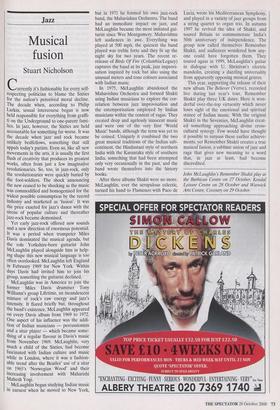Jazz
Musical fusion
Stuart Nicholson
Currently it's fashionable for every self- respecting politician to blame the Sixties for the nation's perceived moral decline. The decade when, according to Philip Larkin, sexual intercourse began is now held responsible for everything from graffi- ti on the Underground to one-parent fami- lies. In jazz, however, the Sixties are held accountable for something far worse. It was the decade when jazz and rock became unlikely bedfellows, something that still appals today's purists. Even so, like all new movements in the arts, it is usually. the first flush of creativity that produces its greatest works, often from just a few imaginative revolutionaries. So, too, in jazz-rock, only the revolutionaries were quickly buried by the foot-soldiers. The shock announcing the new ceased to be shocking as the music was commodified and homogenised for the widest possible consumption by the record industry and marketed as 'fusion'. It was the price exacted for jazz's dance with the sirens of popular culture and thereafter Jazz-rock became demonised.
Yet early ja77-rock offered new sounds and a new direction of enormous potential. It was a period when trumpeter Miles Davis dominated the musical agenda, but the role Yorkshire-born guitarist John McLaughlin played alongside him in help- ing shape this new musical language is too often overlooked. McLaughlin left England in February 1969 for New York. Within days Davis had invited him to join his group, something the guitarist declined.
McLaughlin was in America to join the former Miles Davis drummer Tony Williams's group Lifetime, an incandescent mixture of rock's raw energy and jazz's intensity. It flared briefly but, throughout the band's existence, McLaughlin appeared on every Davis album from 1969 to 1972. One aspect of his influence was the addi- tion of Indian musicians — percussionists and a sitar player — which became some- thing of a regular flavour in Davis's music from November 1969. McLaughlin, very much a child of the Sixties, had become fascinated with Indian culture and music while in London, where it was a fashion- able trend after the Beatles' use of a sitar on 1965's 'Norwegian Wood' and their Increasing involvement with Maharishi Mahesh Yogi.
McLaughlin began studying Indian music in earnest when he moved to New York, but in 1971 he formed his own jazz-rock band, the Mahavishnu Orchestra. The band had an immediate impact on jazz, and McLaughlin became the most imitated gui- tarist since Wes Montgomery. Mahavishnu left audiences in awe. Everything was played at 500 mph, the quietest the band played was treble forte and they lit up the night sky for two years. The recent re- release of Birds Of Fire (Columbia/Legacy) captures the band at its peak, jazz improvi- sation inspired by rock but also using the unusual meters and tone colours associated with Indian music.
In 1975, McLaughlin abandoned the Mahavishnu Orchestra and formed Shakti using Indian musicians to explore the cor- relation between jazz improvisation and the extemporisation employed by Indian musicians within the context of ragas. They created deep and agelessly innocent music and were one of the very first 'World Music' bands, although the term was yet to be coined. Uniquely it combined the two great musical traditions of the Indian sub- continent, the Hindustani style of northern India with the Karnataka style of southern India, something that had been attempted only very occasionally in the past, and the band wrote themselves into the history books.
After three albums Shakti were no more. McLaughlin, ever the scrupulous eclectic, turned his hand to Flamenco with Paco de Lucia, wrote his Mediterranean Symphony, and played in a variety of jazz groups from a string quartet to organ trio. In autumn 1997 he revived the idea of Shakti, and toured Britain to commemorate India's 50th anniversary of independence. The group now called themselves Remember Shakti, and audiences wondered how any- one could have forgotten them. They toured again in 1999, McLaughlin's guitar in dialogue with U. Shrinivas's electric mandolin, creating a dazzling universality from apparently opposing musical genres.
This year, supporting the release of their new album The Believer (Verve), recorded live during last year's tour, Remember Shakti play three UK dates. Here is won- derful over-the-top virtuosity which never loses sight of the emotional and spiritual stance of Indian music. With the original Shakti in the Seventies, McLaughlin creat- ed something approaching divine cross- cultural synergy. Few would have thought it possible to surpass these earlier achieve- ments, yet Remember Shakti creates a true musical fusion, a sublime union of jazz and raga that gives new meaning to a word that, in jazz at least, had become discredited.
John McLaughlin's Remember Shakti play at the Barbican Centre on 27 October, Kendal Leisure Centre on 28 October and Warwick Arts Centre, Coventry on 29 October.


























































































 Previous page
Previous page